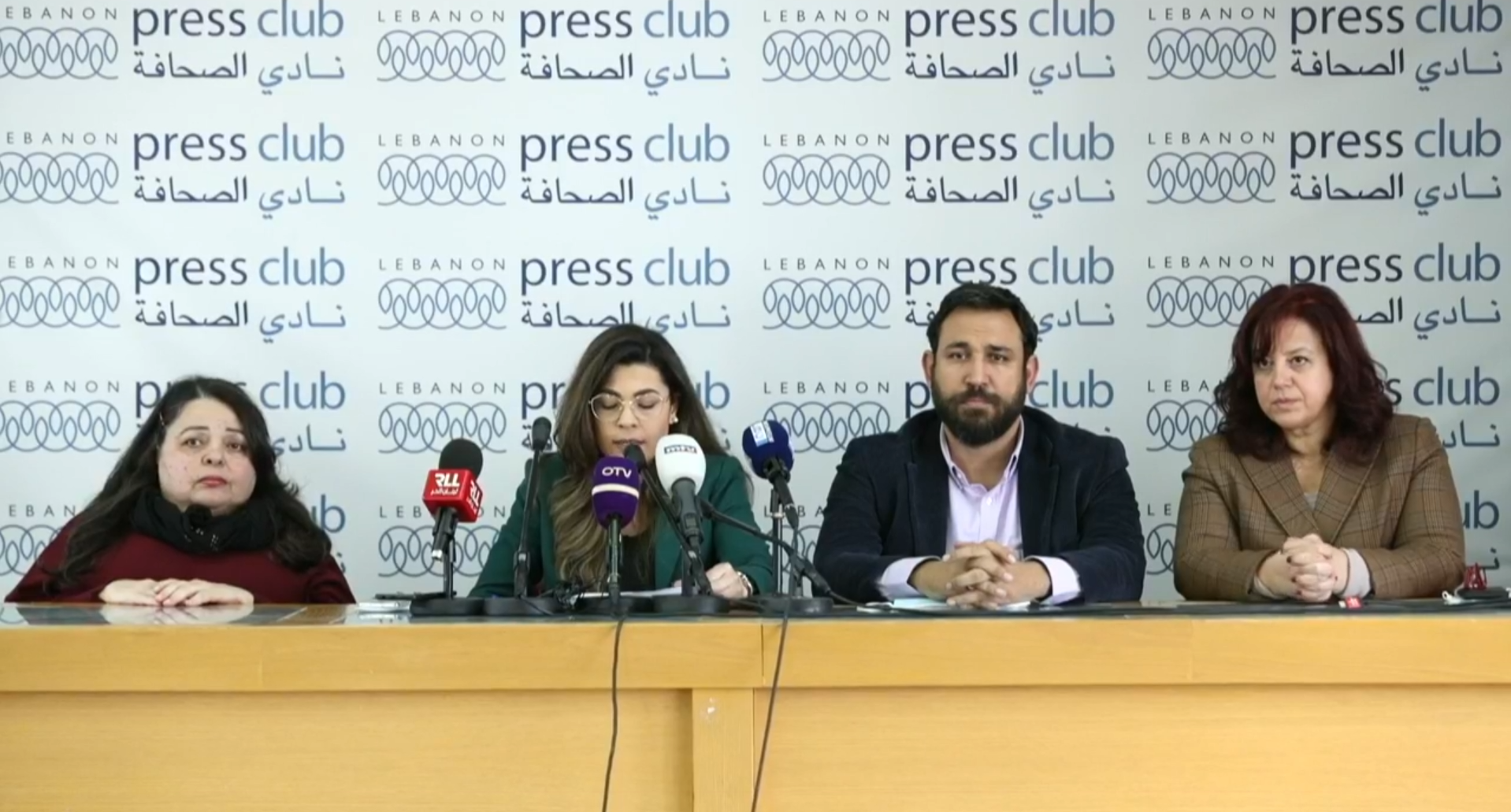
Press Statement issued by the Electoral Reform Alliance: The Alliance holds the political authorities responsible for any plan or scheme to postpone the elections
The Electoral Reform Alliance holds the Lebanese government as a whole, the Parliament, and the Supervisory Commission for Elections (SCE) responsible for any scheme or pretext to postpone the elections scheduled three months from today. The lack of seriousness and respect in the organization and management of the electoral process are indications that we are facing two choices: either a prelude to dismiss the elections, or elections that lack integrity, transparency and democracy. Today, the Alliance is addressing the public to shed light on all the political, logistical and technical challenges that stand in the way of a democratic electoral process. The Alliance also calls on the Lebanese government, especially the Ministries of Interior and Foreign Affairs, as well as the Parliament to rectify the course of the elections, otherwise we will be facing undemocratic elections.
- Politically:
- - The many statements made by a number of political parties and politicians about the possibility of postponing the elections and linking the postponement to several factors related to external spending, in addition to the economic and security conditions, while disregarding the fact that holding the elections is a constitutional duty.
- - Increased clientelism in the form of donations offered by potential candidates to a number of municipalities, authorities, ministries and state agencies, as well as in-kind and cash assistance to voters, taking advantage of Article 62 of the Electoral Law and the socioeconomic conditions afflicting the citizens.
- As for the technical and logistical aspects of preparing for the elections, we would like to remind of the following:
- - Until the date of this statement, no clear budget was allocated for the elections. There is also a stark absence of figures related to the cost of conducting the elections, especially since the election process for the diaspora requires a budget in fresh dollars.
- - Uncertainty regarding the government's position on appointing a new SCE and putting an end to discussions regarding the matter, despite the fact that Council of Ministers has recently appointed several other commissions, mainly the National Anti-Corruption Commission (NACC).
- - Lack of clarity regarding the fate of the current SCE, which announced that it has begun its work despite being short on members and unavailability of a quorum.
- - Non-disbursement of the funds necessary for the work of the SCE, while electoral campaigns have started since the application for candidacy opened on January 10, 2022.
- - The absence of a mechanism to be adopted by the SCE to monitor electoral spending, which begins on the date of the launch of electoral campaigns, and not on the date on which candidates submit their candidacy applications, as well as the absence of a mechanism for monitoring electoral media and advertising and diaspora elections.
- - The Parliament has not yet discussed the amendment of the articles on fines and financial penalties to match the reality of the currency collapse. It also did not amend the electoral spending ceiling despite holding extraordinary sessions.
- - To date, the Ministry of Interior and Municipalities has not started to equip polling stations to be inclusive and accessible to all marginalized social groups, particularly persons with disabilities; noting that the Lebanese Union for People with of Physical Disabilities had submitted more than one proposal demanding the use of ground floors and playgrounds available at 44% of public schools adopted as polling stations, as well as the use of elevators available in the 26 public schools where elections are held. It should be noted that in the 2018 elections, the ground floors were not used and the elevators were closed at the polling stations, which led to the participation of only 4,000 disabled and elderly voters in the voting process. Knowing that more than 80,000 persons over the age of 21 hold a disability card.
- - On January 18, the Ministry of Foreign Affairs and Emigrants issued a circular to diplomatic and consular missions abroad, stipulating the formation of a committee consisting of 11 members within the ministry whose mission is to implement and follow up on diaspora voting. However, Article 123 of the Electoral Law clearly states that a joint committee must be established between the Ministry of Interior and Municipalities and the Ministry of Foreign Affairs and Emigrants, based on a decision issued by the two competent ministers, whose mission is to follow up on elections abroad, so what is the function of each committee?
- - Preliminary lists of voters for polling stations abroad have not been issued as of yet. The deadline for the issuance of these lists was January 15, 2022. This is a clear violation of the Electoral Law.
All these political, logistical and technical indicators inevitably affect the general course of the elections, as well as the behavior of voters. At a time when the authorities responsible for organizing the elections should have been working to prepare for the municipal and parliamentary elections, we see them boasting and bragging about postponing the municipal elections without the slightest respect for the legal deadlines, and looking for a resource to cover the costs of the parliamentary elections.
Based on the above, we, as an Electoral Reform Alliance, demand the following:
- - The government should take a clear position regarding the appointment of a new SCE to supervise the elections and should not defer it and use it as an excuse. Currently, there is a commission, but we do not know if the quorum is met in it, and we know nothing of its fate.
- - Allocating and disbursing funds to the SCE to begin carrying out its tasks and to form its team to monitor electoral media and advertising and electoral spending based on a clear mechanism and methodology. The evasiveness in forming a new commission and the ambiguity about the fate of the current one reflects the absence of political intention to set the electoral wheel in motion, and it is not acceptable to leave this matter for negotiation and political bazaars.
- - The current SCE must explain to the public in full transparency the obstacles it is facing and that are preventing it from exercising its duties stipulated in the law, as partner in managing the electoral process.
- - Allocating and disbursing funds to manage and organize the electoral process in Lebanon and abroad without delay, for evasion in this regard has serious consequences on the entire electoral process.
- - The Parliament must amend the articles related to fines and financial penalties to go in par with the reality of the currency collapse and must amend the electoral spending ceiling as soon as possible.
- - The Ministries of Foreign Affairs and Interior must coordinate to run the diaspora elections, especially after talk about the possibility of closing a number of consulates and embassies abroad. Both ministries must address the public in all transparency regarding the seriousness of organizing the elections and the role of the joint committee as well as the committee formed by the Ministry of Foreign Affairs.
- - Issuing the preliminary lists of voters for polling stations abroad as soon as possible and respecting the process for organizing elections abroad.
- - The Ministry of Interior should work on finding immediate solutions to enable the setup of inclusive polling stations that are available to all marginalized social groups, particularly persons with disabilities. It also should immediately start setting a work schedule with the Ministry of Education to begin the implementation of the required procedures, given the limited time remaining. Further, all forms of communication must be adapted to ensure that information reaches people with different disabilities, and their right to use facilities of their own choosing to assist them during the voting process should also be respected.
- - Candidates should not take advantage of the deteriorating economic, financial and political conditions and the fragility of the state's financial institutions to provide various services depending on the needs of each administration, and use that later as leverage during the elections. They should also stop providing in-kind and cash assistance to voters, as these payments are considered a form of influencing the choices of voters and their electoral behavior in accordance with international standards for electoral integrity.
In view of all of the above, the Alliance demands the government, relevant ministries, and parliament, to fulfill the aforementioned pressing demands without delay. We also warn that all indications so far are nothing but conclusive evidence that the political authority does not intend to hold free and democratic parliamentary elections on time. We hold this authority responsible for any attempt to confiscate the right of Lebanese men and women to choose their representatives and hold them accountable according to legal and constitutional deadlines.
To check the press statement in PDF:





